Some attacks against the United States are likely regardless of who occupies the Oval Office, writes Dan Byman. President Trump’s response, however—at home and abroad—will tell us a great deal. This piece originally appeared on Lawfare.
The days after a terrorist attack are trying for any president. Initial reports of responsibility are often wrong, and the public response is a loud mix of fear, demonstrations of support for the victims, and calls for revenge. Americans look to the president and his advisors for information on the scope and scale of the threat, and as the repositories of national security information, the presidents has a tremendous opportunity to control our national narrative. As the cries grow ever louder, the president must show resolve and reassure the American people that the U.S. will respond effectively. At the same time, he must avoid overreacting.
I worry that President Trump will bungle the response to a jihadist terrorist attack on U.S. soil, making the fear worse at home and helping the terrorists score a win.
Although I’m on record saying that the terrorism danger to the U.S. homeland has so far proven manageable, some attacks are likely regardless of who occupies the Oval Office. Since September 11, 2001, 95 Americans have died from jihadist-linked attacks on U.S. soil—an average of almost six a year. Of course, we’ve seen near-misses like the 2009 “underwear bomber,” who was able to to slip a bomb through airport security. Especially with the rise of lone wolves, who are difficult to identify and disrupt, it is not realistic to expect the government to stop every terrorist attack. Finally, because of the steady success of the U.S.-led military campaign against the Islamic State, we should expect a rise in terrorism as the group seeks to demonstrate its relevance as it loses territory and prestige in the region. So we should recognize that some attacks are likely and, for Trump critics, that they are not inherently linked to who won the 2016 election. If and when it happens, it won’t prove anyone was right to vote for Hillary.
Trump’s response, however, will tell us a great deal.
The best response in the hours after an attack involves a mix of rhetoric, leadership, and caution. The president should publicly honor the dead and reassure Americans that the government is working to hunt down the guilty and care for those injured. At the same time, he should point out that American Muslims have proven vital allies against terrorism. As FBI Director James Comey put it, “They do not want people committing violence, either in their community or in the name of their faith, and so some of our most productive relationships are with people who see things and tell us things who happen to be Muslim.” Almost half of all tips on extremism come from the community.
An immediate retaliatory strike—one that on its surface would signal toughness and thus be attractive to a president who talks about toughness a lot—might be a mistake. Initial information on responsibility or the extent of overseas links is often flawed or incomplete, and it is useful for the administration to assess a full range of options before plunging in. Since the Trump administration is already hitting the Islamic State hard, it’s difficult to imagine an easy way to ratchet up the pressure that does not involve significant costs or downsides. Instead, various agencies should be scrutinizing intelligence and security procedures to determine culpability and identify real and potential holes while the military and intelligence agencies assess options overseas.
Based on his initial record in office and rhetoric on the campaign trail, however, Trump might opt for a disastrous approach. The president acts out of impulse, whether this involves sarcastic tweets to Arnold Schwartzenegger or the sudden decision to bomb Syria after the regime’s use of chemical weapons. It’s safe to say that restraint and deliberation are not characteristics of this administration—or the man himself. Perhaps even worse, this administration has a track record of mismanaging policy processes. This includes signature items like the “Muslim Ban” executive order or less prominent but important announcements, like the supposed deployment of an aircraft carrier to Korea. This bungling and the president’s many about-faces on issues have damaged his credibility as a messenger and are likely to make people more skeptical of the content of his statements and actions in the aftermath of a terrorist attack.
The president is likely to want to overreact abroad. He seems to want to appear tough more than he wants to be effective. So he boasted, for example, about dropping a massive bomb on Islamic State targets in Afghanistan without waiting to learn whether it achieved its objectives. On the campaign trail, the president wanted to “bomb the shit out of them” even though it was not clear an increase in the scale of bombing would achieve much. Trump might also expand the war, bringing it to new zones that have only a tenuous Islamic State or al-Qaida presence. He has already authorized the intensification of US operations targeting Shabaab and increased the pace of strikes targeting terrorist groups more generally.
Even more worrisome is what the President might do at home. On the campaign trail, the President repeatedly conflated Muslims and terrorists, and with tensions and emotions running high after an attack this demonization might be especially likely. In the name of border security, he might further limit immigration and travel from Muslim-majority countries or try to single out Muslims over other faith communities. He might embrace the decision to declare the Muslim Brotherhood a terrorist group even though this would be counterproductive and cause difficulties with several allies. Surveillance of Muslim communities around the country might be stepped up, further alienating Muslims from law enforcement and make them less likely to turn in suspected terrorists. After 9/11, the United States detained over one thousand Muslims, gaining almost no useful intelligence but harming relations with the community. As Daniel Benjamin, a former senior counterterrorism official, warns, “Repairing the damage from that crackdown took years.”
Such unthinking measures might benefit Trump politically while inadvertently helping the terrorists operationally. Trump would look tough, and his argument that the terrorism danger is high and Muslims are the enemy would be vindicated, at least to his supporters and to some who are undecided on this question. The Islamic State would gain more evidence to back up the narrative that the United States is hostile to Muslims, while the vast majority of Muslims who loath the group would be less eager to work against it because it means working with what they see as a hostile government. It’s just the American people who would suffer.
A possible bright spot is that many of these potentially harmful actions depend on the so-called “axis of adults:” the seasoned and professional members of Trump’s foreign policy team. Secretary of Defense James Mattis, National Security Advisor H.R. McMaster, and FBI Director James Comey would be important players as events unfolded. They and their staffs must prepare politically for such an attack, developing a range of options and contingencies that vary depending on the scope and nature of the attack. They also need to be ready to make the case that prudence and planning should trump instinct and impulse, a particularly hard sell after American blood has been spilled. U.S. allies, or at least the few that have gained the President’s respect, must also be ready to make the case for a careful response. In the end, the best U.S. response may involve significant military force under U.S. leadership or other tough and controversial measures, but these are more likely to have sustained support if the President can convince skeptics he has explored all options and acted deliberately.
The Brookings Institution is committed to quality, independence, and impact.
We are supported by a diverse array of funders. In line with our values and policies, each Brookings publication represents the sole views of its author(s).

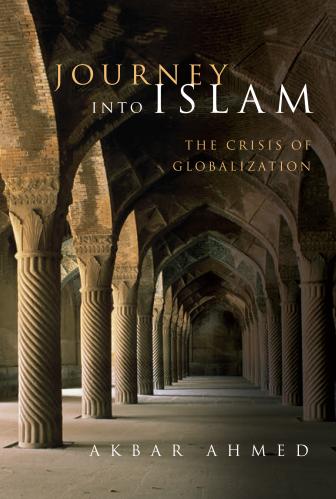
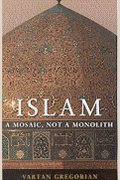
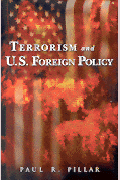
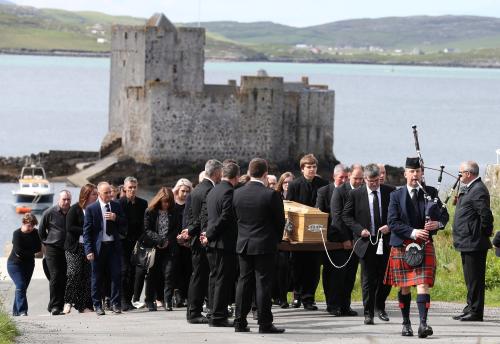
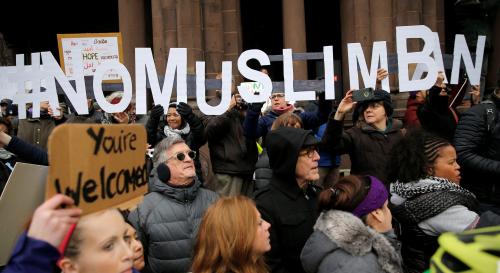
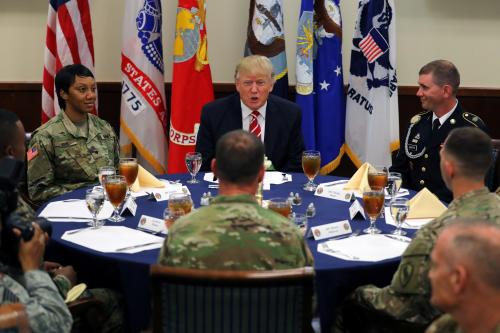




Commentary
Trump and the next terrorist attack
May 3, 2017